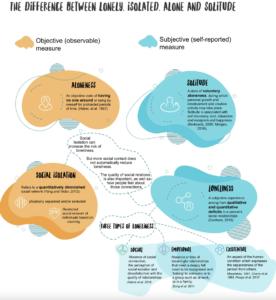Having someone to rely on in times of trouble is the number one determinant of high wellbeing in nations, so taking action to tackle loneliness and to improve the evidence base around effective interventions is really important.
A year ago, the What Works Centre for Wellbeing joined forces with the Campaign to End Loneliness to increase our action and knowledge on loneliness, civil society, community and connection. We work together to reduce loneliness in children, young people, and working age adults, as well as people in later life.
In November 2021, the National Institute for Health Research (NIHR) launched a collection of research on loneliness in older adults. The collection, along with an accompanying podcast, highlight some of the evidence that could help policy makers and practitioners address this growing problem. Helen Saul, Editor-in-Chief of NIHR Evidence takes us through the findings…
The pandemic threw a spotlight on loneliness and social distancing caused heartache for so many. But it made little difference to the day-to-day lives of some older people. They were already isolated, lonely and “living the COVID life before the pandemic came along”.
This comment was made by occupational therapist Sarah Page and was one of many that stayed with me after putting together a Collection of research on loneliness in older adults. The Collection brings together key findings from NIHR. It builds a picture of what is known about loneliness in older adults, and what is needed, to address the problem.
Sarah Page said that in lockdown, the general population experienced the isolation that many older people put up with all the time. She was passionate about the need for change to help this vulnerable group. “If you’re going to have a care plan that says ‘medication four times/day’, why on earth can’t it also say ‘intervention activities four times/day?’ Why is that so far removed from reality?”
Reducing loneliness among older people is a challenge for time-poor professionals. Any changes in practice need to be based on sound research. The NIHR funds and delivers world-leading health and care research and, long before the pandemic started, was funding studies on loneliness. The Collection aims to bring key findings from this research to the attention of those who can act on it. That is, health and care professionals, policy makers, carers and people who are lonely.
Research links loneliness to depression and dementia
Andrew Steptoe, Professor of Psychology at University College London, is the principal investigator of the long-running English Longitudinal Study of Ageing (ELSA). It includes thousands of over-50s, some in their 90s, who have been followed up for years. Their health, social experience and economic circumstances are regularly assessed to look at the changes in people’s lives as they get older.
A study in the NIHR Collection is based on some of the people included ELSA. It found that those who were lonely in 2004 were more likely to be depressed 12 years later. Their depression was not associated with their age, social class, health or their social activities. It seemed to be a direct link with their loneliness many years earlier. The researchers conclude that reducing loneliness could prevent up to one in five cases of depression in older adults.
Another ELSA study found a close link between loneliness and dementia. The researchers could not conclude that loneliness caused dementia. But Andrew Steptoe said it suggests that people who are lonely are losing brain function more rapidly than others.
Social isolation and loneliness are not the same
Researchers were surprised to find in this ELSA study that social isolation was not as strongly linked with dementia as loneliness. Social isolation can be measured in terms of contact with family, friends and social activities. But loneliness is an emotion. It is the distress people feel when they lack the relationships they would like to have. Social isolation and loneliness overlap and one can lead to the other. But they are not the same. People may happily choose to have only a few contacts, but they would not choose to feel lonely.
Kalpa Karicha, from the Campaign to End Loneliness, highlighted that people who are lonely need measures to address the emotional and psychological aspects of loneliness and to improve the quality of their relationships. Bringing people together might reduce their isolation without touching the underlying causes of their distress.
Many people will need some help to avoid loneliness as they get older. We hope that this Collection and the accompanying podcast will highlight some of the evidence that could help address loneliness.

